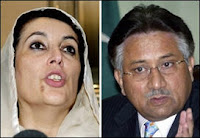
If reports about the ongoing discussions between President Musharraf and the former prime minister Benazir Bhutto are accurate, then Musharraf may soon cease to be a general and Bhutto may take up her old job: this is one step forward and two steps back for constitutional government in Pakistan.
No doubt there's a strong argument that the president of a country should not also be the commander in chief (though the framers of the US constitution disagreed). So the deal will fix that anomaly. But, in return, to allow Bhutto to have a third term as prime minister, the constitution will be amended and all corruption charges against her will be dropped.
It is difficult to see how this is a positive development for the rule of law in Pakistan. However, constitutional exception-making, frankly, is commonplace in Pakistan's history. And this is not the worst element of the deal. The practical consequences for democracy, economic growth, peace with India and the struggle against extremism will be much more serious.
It may seem odd to say that ending military leadership is bad for democracy. However, the advantage of having the general-as-president is that he is less dependent on traditional party politics. That model of politics is tribal and feudal, whereby power is transmitted from the people to political leaders through major landowners, industrialists and imams. The great hope that Musharraf manifested for a while, when he first came to power, was that he was going to wreck this structure. His move to create councils at a local level, guaranteeing representation for women and minorities, empowering a new generation of grassroots leaders, was a critical first step in doing so. His deal with Bhutto, if concluded, will signal that this new politics has failed and it is difficult to see Bhutto, whose base of major supporters is relishing the prospect of returning to power, having the political chutzpah to resurrect it.
Equally, Bhutto's return to power is a risk to the economy. As Musharraf documented in his recent book, In the Line of Fire, Pakistan's economy stagnated under Bhutto during the 1990s, levels of poverty rose and massive sums of money mysteriously disappeared from public accounts. Shaukat Aziz, Pakistan's current prime minister, a technocrat, who formerly was a high-ranking executive at Citibank, has overseen a remarkable turnaround in the economy that has delivered a double-digit growth rate and a large boost in Pakistan's foreign currency reserves.
Finally, there are the security issues. Throughout Pakistan's history, the relationship with India has been tense. But Musharraf has handled it with care, and has outlined a possible settlement over Kashmir. He has been able to do this because he is the army chief. A civilian leader like Bhutto will find it much more difficult to continue or accelerate the development of friendly relations with India. This is partly because the bellicose elements in the military and intelligence services will be released from the yoke of their commanding officer but also because hostility towards India is popular in Pakistani politics - this isn't Bhutto's fault but she may not be able to resist the temptation to play to the gallery.
She will face a similar political logic over combating extremism. Pakistan is not a militantly religious country - there are strong streams of heterodox religious practice and a powerful drift is underway towards western cultural values. But, even though most people do not agree with the extremists, they are intensely uncomfortable with seeing the police or armed forces attack religious schools or mosques, where extremists may be based. Musharraf has been able to pursue this cause, to a limited extent, because of the uniform; Bhutto will not be able to continue it with even the same vigour, let alone enhance it.
In the end, this deal is not only crooked, it is a setback for anyone who wants a liberal and democratic future for Pakistan.
By Kamran Nazeer



No comments:
Post a Comment